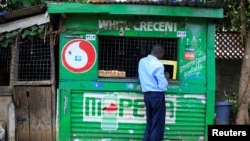When the coronavirus began hitting Western economies, it hurt the economies of African countries, too – not only because of a loss in trade and tourism, but also due to a loss in remittances.
Hundreds of thousands of African families depend on money sent home by relatives working in North America, Europe and elsewhere. The safety net for millions of people is now threatened, and some families fear for the worst.
Fatuma Salah is a Somali national living at the Dadaab refugee camp in Kenya. The mother of six says she closely monitors any message that comes to her phone.
“Each time I receive a message alert, I think it’s a money transfer to my account, but it's not. I was expecting to receive money from my family, it’s the 10th day of the month. I haven’t received anything yet,” she said.
Salah depends financially on her mother and brother who live in the United States. But both have lost their jobs and are staying indoors due to the COVID-19 pandemic.
In 2018, Africans received $82 billion in remittances from abroad, according to the Washington-based Brookings Institution.
Remittances amount to 5% of GDP in at least 13 African countries. For some, like tiny Lesotho, they amount to 23% of its annual income.
With stay-at-home orders throwing millions out of work in Western countries, millions of Africans are feeling the pinch.
Adhieu Achuil, a South Sudanese student studying in Kenya, says she is afraid she might end up homeless, just like her neighbors.
“If it continues for two to three months, I don’t know what is going to happen, not only to me, to the people I know who are staying in Nairobi, who are being supported by their relatives or husbands in the USA. At the moment, we have people who are staying at public schools since they cannot afford to pay rent,” Achuil said.
Abdirashid Duale, the head of Dahabshiil, one of Africa's money transfer service provider, says his company has seen a reduction in the number of people sending money to the continent.
“We have seen less money going to Africa, but of course, the current crisis has impacted the community we serve. We are sorry a lot of people in the diaspora have got the virus, a lot of families are not helping the way they used to help. These remittances, poor people rely on it, whether they are in refugee camps, whether they are paying school fees or food,” he said.
Duale, whose company operates in at least 40 countries in Africa, calls on the financial institutions and governments to make sending and receiving money easy because it saves lives.
“We would like the international governments, European governments, UK financial institutions to help so that [the] community [which] has access to banking, the company, like Dahabshil, has full access to the commercial banks so that remittances that are going to Africa will not be stopped, will continue to reach people safely,” Duale said.
The United Nations Economic Commission for Africa (ECA) said last month Africa needs $100 billion to combat the virus and support its vulnerable citizens and economies.




